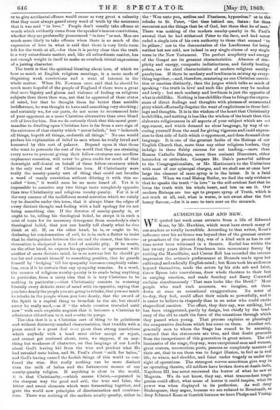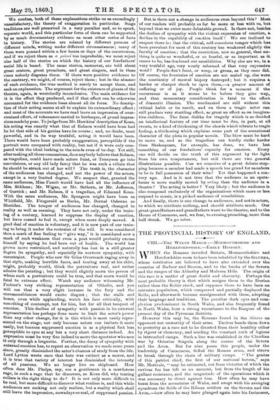AUDIENCES OLD AND NEW.
WE quoted last week some extracts from a life of Edmund Kean, by Mr. Hawkins, which must have struck many of our readers as totally incredible. According to that writer, Kean's influence over his audience was beyond that of the greatest orators or preachers of the present day, was of a kind such as has in our time never been witnessed in a theatre. Rachel has within the last twenty years driven Frenchmen into momentary frenzy by reciting the Marseillaise, and Currer Bell has recorded the intense impression the actress's performance at Brussels made upon her cultivated and radically English mind ; but Kean took his audiences beyond themselves, made the actors by his side sob and faint, threw Byron into convulsions, drew whole theatres to their feet in surging emotion, and made Southey and Barry Cornwall exclaim simultaneously 'That man looks like the Devil !' Most people who read such accounts, we imagine, set them down at once as sensational exaggerations. No actor of to-day, they feel, could affect their minds so powerfully, and it is easier to believe in rhapsody than in an actor who could excite rhapsodical emotion. The effect, they dare say, was striking, but has been exaggerated, partly by design, but chiefly by the tendency of the old to exalt the force of the sensations through which they passed when young. That process explains so pleasingly the comparative deadness which has come on them. Another set, generally men to whom the Stage has ceased to be amusing, contend that the statements are true, and that doubt proceeds from the inexperience of this generation in great actors. The old luminaries of the stage, they say, were exceptional men and women, great orators, unconscious poets, persona so completely masters of their art, that to see them was to forget illusion, to feel as in real life, to wince, and shudder, and faiut under tragedy as under the sight of operations. The strongest nerves sometimes give way in an operating theatre, old soldiers have broken down at death-beds, Napoleon III. has never recovered the horror of what he saw at Magenta. We do not know, they say, what trancendent tragic genius could effect, what sense of horror it could inspire, what its power was when displayed in its perfection. As well deny Shakespeare, they argue, because we are reduced to Boucicault, as deny Edmund Kean or Garrick because we have Phelps and Vining. We confess, both of these explanations strike us as exceedingly unsatisfactory, the theory of exaggeration in particular. Stage traditions are well preserved in a very peeuliar and, so to speak, separate world, and this particular form of them can be supported by as much documentary evidence as most other series of facts in history. The stories are related by different persona of different minds, writing under different circumstances ; many of them were penned within a few hours or days of the occurrences, and if we reject them as a priori too improbable, we must reject also half of the stories on which the history of our forefathers' social life is based. The same stories, moreover, are told about great orators, great preachers, and great singers, and is these cases nobody disputes them. If there were positive evidence to the contrary, we might, of course, reject them; but in the absence of such evidence, the true method is surely to accept them, and seek an explanation. The argument for the existence of giants of-the theatre, again, is wretchedly inconclusive. The main evidence for it is the effect they produced, and if that effect can be otherwise accounted for the evidence loses almost all its force. No description of their acting seems at all to explain its extraordinary effect ; and most of the accounts we have read leave an impression of overstrained effort, of vehemence carried to burlesque, of grand impres sionsinade by pose. To judge from Mr. Hawkins' description of Kean, his acting was exactly what that of Robson would have been had he let that side of his genius have its course ; and, no doubt, most powerful, and in its way truthful, acting it would have been. There would have been probably exaggeration, perceptible if the portrait were compared with reality, but not if it were only coinpared with the ideal lurking ip the minds even of to-day. Yet still, after making:ill those concessions, does anybody believe that Robson, as tragedian, could have made actors faint, or Tennyson go into -convulsions, or any old lady fancy that he was such a villain that ,he should be struck out of her will ? The truth is, the character of the audiences has changed, and not the power of the actors, except in a very limited degree. We suspect that, granted the same audiences, Miss Faucit would have had all the influence of Mre. Siddons ; Mr. Wigan, or Mr. Sothern, or Mr. Jefferson, -of Garrick ; and Mr. Robson, if a tragedian, of Edmund Kean. With the same audiences, Mr. Spurgeon might have been as Whitfield, Mr. Fitzgerald as Burke, Mr. Bernal Osborne as Sheridan. The temper of audiences has changed, changed in reality as well as seeming. They have not only, under the training of a century, learned to suppress the display of emotion, but have ceased to feel it, except when more deeply moved. A good deal of emotion is voluntary, and it is now part of our training to bring it under the restraint of the will. It was considered then a mark of fine feeling to "give way," it is considered now a -mark of such weakness that even a poet would probably excuse himself by saying he had been out of health. The world has grown more restrained, and naturally has lost in a still greater degree its sympathy, and especially its, nervous sympathy, with unrestreint. People who saw Sir Giles Overreach raging away in that style, making horrible faces, and tearing away at his shirt, might, probably would, think the portraiture real, and rather admire the painting ; but they would slightly scorn the person of whom such a portraiture could be true, and that scorn would be fatal to extreme effect. Watch any audience witnessing Mr. Fechter's very striking representation of Othello, and you will see that a very slight increase in the fury and the -unreasonableness would excite disgust ; that the stalls and boxes, even while applauding, watch his face critically, with something of contempt, not for him, but for all that tempest of emotion. This decline of sympathy with passion in its external representation has perhaps done more to limit the actor's power than any other change, for it is this which is most easily repre-seated on the stage, not only because actors can imitate it more easily, but because suppressed emotion is as a physical fact less perceptible to eyes at any but a very short distance indeed. An expression must be very fine indeed to move the spectator who sees at only through a lorgnette. Further, the decay of sympathy with external emotion has, to repeat an observation we made some years -mace, greatly diminished the actor's chances of study from the life. Lord Lytton wrote once that hate was extinct as a motor, and it is true that variety of interest has diminished the intensity of all passions. We no longer live on shipboard. How often does Mr. Phelps, say, see a gentleman in a murderous rage, in such a rage that he discovers, as Kean did, why tearing -collars is the right thing to do ? It is not only more difficult to be real, but more difficult to discover what realism is, and this while audiences are seeking not only realism, but a reality which shall still leave the impression, nowadays so real, of suppressed passion. But is there not a change in audiences even beyond this? Most of our readers will probably so far be more or less with us, but beyond that we enter more debatable ground. Is there not, besides the decline of sympathy with the violent expression of emotion, a decline in the capability of emotion itself ? We are inclined to suspect there is; that the critical, self-couscious temper which has been prevalent for most of this century has weakened slightly the faculty of emotion ; that the conviction, now, so general, that nothing is quite so wonderful, or so fearful, or so important as it seems to be, has deadened our sensibilities. Why else are we, iu a very truthful age, very nearly ashamed of that very expressive word ? People don't faint, or weep, or groan, as they once did. Of course, the fountains of emotion are not sealed up, else were the continuity of mental history destroyed ; but it requires a harder or sharper shock to open them,—a greater amount of suffering or of joy. People think for a moment if the occurrence is as it seems to be before they give way, and that momentary consideration is fatal to the effect of dramatic illusion. The uneducated are still without this critical habit or its result, and on them a tragic actor can still produce very startling effect, as great an effect as on imaginative children. The faiut dislike for tragedy which is so decided an intellectual feature of our time must be due, is part, at all events, to a kind of thickening of the chords which vibrate to tragic feeling, a thickening which explains some part of the sensational character of the plots in popular novels. The blow must be hard to move us, and as the tragedian can hardly strike harder than Shakespeare, for example, has done, we have lost something of our forefathers' capacity for emotion. Every one will decide on the truth of this argument by the light from his own temperament, but still there are two general illustrations possible. Can we conceive of a great debate stopping because a member had made a speech too grand for members to be in full possession of their wits? Yet that happened a century ago. And is it not true that the audience is an operahouse is more readily moved by acting than the audience in a theatre? The acting is better ? Very likely ; but the audience is also composed exclusively of the organizations which more or less, respond to music, is a picked audience of sensibilities.
And finally, there is one change in audiences, and not in actors, to which we attribute nothing, and should attribute much, Our great-grandfathers and grandfathers went to the theatre, and to the House of Commons, and, we fear, to evening preaching, more than half drunk. We go sober.































 Previous page
Previous page